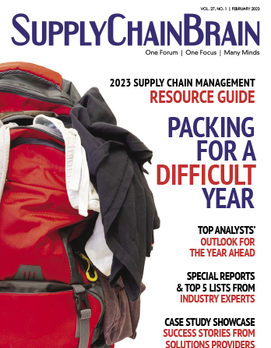
Home » How a Major Restaurant Equipment Supplier Weathered the Pandemic
CASE STUDY
How a Major Restaurant Equipment Supplier Weathered the Pandemic

August 1, 2022
Few businesses took a bigger hit from the COVID-19 pandemic than restaurants — and, by association, the companies that supply them.
Parts Town LLC is a major distributor of equipment and replacement parts to original equipment manufacturers in the foodservice sector. With a product list of around 1.8 million SKUs and a ship rate of 7,000 orders per day, it supports hundreds of thousands of restaurants and commercial kitchens across the country.
Parts Town had one advantage during the pandemic over other businesses that experienced severe supply chain disruption: It keeps a lot of inventory on hand. The goal is to “satisfy our customers as a one-stop shop,” says chief operating officer Rony Kordahi. Customers can order up until 9 p.m. Eastern and have their items shipped on the same day.
The company wasn’t immune from the staffing problems caused by COVID-19. But it was helped by a flexible approach to labor deployment. “Everyone is hands-on and into the details,” says Kordahi. “They’re willing at any point to jump in. In times of stress, you would find our senior leadership team working shoulder to shoulder with everyone in the DC to get things done, if we couldn’t find the staff levels that we needed.”
Throughout the 2000s, Parts Town found itself grappling with the challenge of maintaining high levels of customer service in the face of vibrant growth. The pandemic temporarily interrupted an annual growth rate of around 20%, according to senior director Kenny William. “When you grow that fast, you get the doubling effect,” he says. “Everything gets more complicated exponentially.”
As it swapped out legacy warehouse-management software, and upped staffing levels in line with growing demand, Parts Town began searching for creative solutions to speeding up order processing in the DC. William approached Bastian Solutions, a provider of storage and order-fulfillment systems, about the possibility of acquiring a robotic pallet stretch wrapper. Upon further discussion with Bastian, however, he was drawn instead to the integrator’s goods-to-person system, beginning with a pack conveyor that was ideal for operating safely in small spaces with dozens of people on the warehouse floor.
Going for Goods-to-Person
Following acquisition of that system, the product that next caught William’s eye was AutoStore, Bastian’s good-to-person system from Bastian that was a relatively recent offering at the time. Joe Campbell, Bastian’s regional manager, says it was clear that Parts Town couldn’t support expanding operations with existing resources.
It wasn’t a difficult pitch. “A lot of times customers that don’t have a lot of automation are afraid to change,” says Campbell. “But I could tell in my conversations with Kenny that Parts Town’s appetite for automation has always been very strong.
Kordahi says Parts Town’s affinity for technology extends throughout its distribution, marketing and e-commerce functions. He believes it’s especially important to be able to marry the company’s physical distribution system with its marketing and inventory strategies. “Without all of those working in harmony,” he says, “it’s just a bunch of robots in the warehouse.”
Parts Town was drawn to AutoStore in part because the system integrated well with its new warehouse management software from HighJump (now Körber). But the results of implementation were even more impressive: a fourfold increase in picking speed, automatic slotting capability, greater storage density, and a flexible configuration of robots and bins.
The system’s overall flexibility, coupled with an intense focus on worker safety, helped Parts Town to weather the inevitable downturn in business caused by the pandemic, as restaurants shut down virtually overnight. Within just a few months, however, orders began to rebound, and operations returned to previous levels without a hitch. “We were ready to serve,” says Kordahi. “We never laid off anyone, we had the inventory, and we kept our relationships with manufacturers and suppliers intact.”
How It Works
AutoStore equipped Parts Town with a system that integrates with robots driving around a grid among stacks of bins, picking those needed for a given order, then delivering to an operator at the perimeter. William says the setup shrinks the footprint of inventory within the facility, allowing for the stacking of bins up to 18 feet high. Compared with traditional grocery-style shelving, that amounts to a 70% savings in space. And the pick rate goes from between 30 to 40 lines per hour to more than 200.
Even so, Parts Town ended up moving to a distribution facility with twice the space, one that was more conducive to the AutoStore technology. The switch occurred “without a single hour of downtime,” recalls William. “We were running a night operation, doing moves while Joe was building AutoStore in the middle of this giant building.” In keeping with the requirements of the much larger space, and to minimize the need for human travel within the facility, it added around 5,000 linear feet of conveyor.
Parts Town used the brief downturn caused by the pandemic to make further modifications to the facility, including the addition of mezzanines, high-bay racking and wire-guided picking.
Parts Town is open to further automation in its warehouse, including additional capability from Bastian. The goal, says Kenny, is to ensure resilience in the face of multiple disruptive events. In all possible cases, he asks: “Is your system robust enough to absorb those issues and keep people moving?"
Read more: 100 Great Supply Chain Partners of 2022: Weathering the Storm Together
RELATED CONTENT
RELATED VIDEOS
Related Directories
Subscribe to our Daily Newsletter!
Timely, incisive articles delivered directly to your inbox.
Popular Stories

2023 Supply Chain Management Resource Guide: Packing for a Difficult Year
VIEW THE LATEST ISSUECase Studies
-
JLL Finds Perfect Warehouse Location, Leading to $15M Grant for Startup
-
Robots Speed Fulfillment to Help Apparel Company Scale for Growth
-
New Revenue for Cloud-Based TMS that Embeds Orderful’s Modern EDI Platform
-
Convenience Store Client Maximizes Profit and Improves Customer Service
-
A Digitally Native Footwear Brand Finds Rapid Fulfillment



